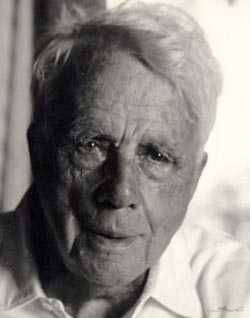|

Robert Frost (1874 - 1963)
Robert Lee Frost, b. San Francisco, Mar. 26, 1874, d. Boston, Jan. 29, 1963, was one of America's leading 20th-century
poets and a four-time winner of the Pulitzer Prize. An essentially pastoral poet often associated with rural New England,
Frost wrote poems whose philosophical dimensions transcend any region. Although his verse forms are traditional - he
often said, in a dig at arch rival Carl Sandburg, that he would as soon play tennis without a net as write free verse - he was
a pioneer in the interplay of rhythm and meter and in the poetic use of the vocabulary and inflections of everyday speech.
His poetry is thus both traditional and experimental, regional and universal.
After his father's death in 1885, when young Frost was 11, the family left California and settled in Massachusetts. Frost
attended high school in that state, entered Dartmouth College, but remained less than one semester. Returning to
Massachusetts, he taught school and worked in a mill and as a newspaper reporter. In 1894 he sold "My Butterfly: An
Elegy" to The Independent, a New York literary journal. A year later he married Elinor White, with whom he had
shared valedictorian honors at Lawrence (Mass.) High School. From 1897 to 1899 he attended Harvard College as a
special student but left without a degree. Over the next ten years he wrote (but rarely published) poems, operated a
farm in Derry, New Hampshire (purchased for him by his paternal grandfather), and supplemented his income by
teaching at Derry's Pinkerton Academy.
In 1912, at the age of 38, he sold the farm and used the proceeds to take his family to England, where he could devote
himself entirely to writing. His efforts to establish himself and his work were almost immediately successful. A Boy's
Will was accepted by a London publisher and brought out in 1913, followed a year later by North of Boston.
Favorable reviews on both sides of the Atlantic resulted in American publication of the books by Henry Holt and
Company, Frost's primary American publisher, and in the establishing of Frost's transatlantic reputation.
As part of his determined efforts on his own behalf, Frost had called on several prominent literary figures soon after his
arrival in England. One of these was Ezra Pound, who wrote the first
American review of Frost's verse for Harriet Munroe's Poetry magazine. (Though he disliked Pound, Frost was later
instrumental in obtaining Pound's release from long confinement in a Washington, D.C., mental hospital.) Frost was more
favorably impressed and more lastingly influenced by the so-called Georgian poets Lascelles Abercrombie, Rupert
Brooke, and T. E. Hulme, whose rural subjects and style were more in keeping with his own. While living near the
Georgians in Gloucestershire, Frost became especially close to a brooding Welshman named Edward Thomas, whom he
urged to turn from prose to poetry. Thomas did so, dedicating his first and only volume of verse to Frost before his death
in World War I.
The Frosts sailed for the United States in February 1915 and landed in New York City two days after the U.S. publication
of North of Boston (the first of his books to be published in America). Sales of that book and of A Boy's
Will enabled Frost to buy a farm in Franconia, N.H.; to place new poems in literary periodicals and publish a third
book, Mountain Interval (1916); and to embark on a long career of writing, teaching, and lecturing. In 1924 he
received a Pulitzer Prize in poetry for New Hampshire (1923). He was lauded again for Collected Poems
(1930), A Further Range (1936) and A Witness Tree (1942). Over the years he received an
unprecedented number and range of literary, academic, and public honors.
Frost's importance as a poet derives from the power and memorability of particular poems. The Death of the Hired Man (from North of Boston) combines lyric and dramatic
poetry in blank verse. After Apple-Picking (from the same volume) is a
free-verse dream poem with philosophical undertones. Mending Wall (also
published in North of Boston) demonstrates Frost's simultaneous command of lyrical verse, dramatic conversation, and ironic
commentary. The Road Not Taken,
Birches (from Mountain Interval) and the oft-studied Stopping by Woods on a Snowy Evening (from New Hampshire) exemplify Frost's
ability to join the pastoral and philosophical modes in lyrics of unforgettable beauty.
The poetic and political conservatism of Frost caused him to lose favor with some literary critics, but his reputation as a major
poet is secure. He unquestionably succeeded in realizing his life's ambition: to write "a few poems it will be hard to get rid of."
Biography by: Biography written by The Academic American Encyclopedia, © 1995 Grolier Electronic Publishing. Compiled and hyperlinked by Gunnar Bengtsson, 2000.
|
